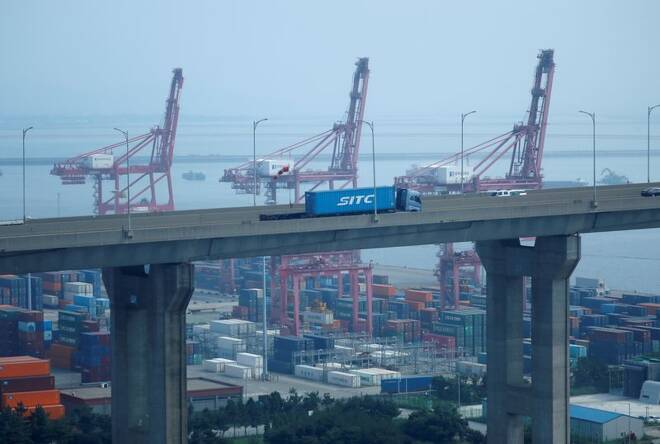Advertisement
Advertisement
South Korea’s weak exports, easing prices may keep rates on hold
By:
By Jihoon Lee and Choonsik Yoo SEOUL (Reuters) -South Korean exports tumbled for the first 20 days of March and producer inflation eased last month, data showed on Tuesday, reinforcing expectations the central bank will not raise interest rates further amid current market turbulence.
By Jihoon Lee and Choonsik Yoo
SEOUL (Reuters) -South Korean exports tumbled for the first 20 days of March and producer inflation eased last month, data showed on Tuesday, reinforcing expectations the central bank will not raise interest rates further amid current market turbulence.
Asia’s fourth-largest economy contracted last quarter for the first time in 2-1/2 years hurt by a slowdown in global demand for its exports and high household debt.
The country’s shipments for the first 20 days of March fell 17.4% from the comparable period of last year even though there was one more working day this year, led by a whopping 36.2% dive in sales to China, customs agency data showed.
Bank of Korea data earlier in the day showed the producer price index (PPI) in February was 4.8% higher than a year earlier, with the pace of increase slowing for an eighth consecutive month.
Economists said these figures confirmed the broad market expectations for weakening economic growth and easing inflation, raising more doubts about the central bank’s tightening stance.
“Inflation will continue to slow and the economic growth will be so-so in the future, and now the overseas banking sector crisis will eventually have an impact here,” said Moon Hong-cheol, economist at DB Financial Investment.
South Korea’s central bank kept the policy interest rate unchanged at its last meeting on Feb. 23, ending a year of uninterrupted rate increases to fight inflation. It next meets on April 11.
The liquidity troubles at U.S. and European banks have sharply increased the volatility in financial markets, and South Korea is also worried about the indirect effects from the turmoil.
“The government is closely watching the situation as volatility in global markets has increased in relation to the failure of Silicon Valley Bank and the liquidity crisis at Credit Suisse,” Minister for Trade Ahn Duk-geun said while presiding over a meeting on exports.
(Reporting by Choonsik Yoo; Editing by Muralikumar Anantharaman and Jacqueline Wong)
About the Author
Reuterscontributor
Reuters, the news and media division of Thomson Reuters, is the world’s largest international multimedia news provider reaching more than one billion people every day. Reuters provides trusted business, financial, national, and international news to professionals via Thomson Reuters desktops, the world's media organizations, and directly to consumers at Reuters.com and via Reuters TV. Learn more about Thomson Reuters products:
Advertisement
